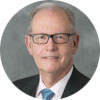Download PDF

The relationship between pharmaceutical and medical device companies and individual physicians is complex. At one end of the spectrum, the three parties are united by a desire to serve patients by developing, evaluating, and effectively disseminating new drugs and devices. Who doesn’t want more effective therapeutic options for glaucoma and diabetic retinopathy? At the other end, substantive (and opaque) financial entanglements can pollute the waters.
Medical societies and academies also risk conflicts of interest given the interface between companies and large meetings, journal and website advertisements, and continuing medical education sponsorship. Fifteen to 20 years ago this was a real problem, with some specialty societies deriving large percentages of their revenue from industry. (That was never the case for the Academy.) Fortunately, for all concerned, a combination of government regulations, industry guidelines, and accreditation agency policies have curtailed those abuses. All organizations accredited to grant continuing CME credits are regularly audited and subject to sanction if violations are detected. Most significantly, nearly a decade ago, the Academy was one of the first of more than 50 medical societies to sign the landmark Council of Medical Specialty Societies policy “Code for Interactions with Companies.” This detailed document and list of signatories is publicly available.1 I can confidently state that the Academy complies with the most stringent of applicable regulations and policies.
But what about individual physicians who are recruited to serve as paid speakers in industry-sponsored speaker programs? (They are sometimes referred to by the companies as “key opinion leaders” or “KOLs.”) We’re not talking here about relationships as consultants, receiving research support, or serving in clinical trials. This concerns being paid by a company to speak to other physicians to impact clinical decision-making. The Office of the Inspector General (OIG) for the U.S. Department of Health and Human Services warns of “the fraud and abuse risks associated with the offer, payment, solicitation, or receipt of remuneration” in industry-sponsored speaking programs.2,3 How big an issue is this? In recent years, aggregate payments have approached $1 billion. While oncology, cardiology, and orthopedics tend to top the list, ophthalmologists are represented as well.
Why is the OIG concerned? Because they deem this to be a violation of the federal False Claims Act and anti-kickback statute by inducing physicians to differentially prescribe drugs and devices to beneficiaries in federal health programs, costing the government billions of dollars annually.
KOLs have unique value in this setting. They are not company employees. They are generally respected and trusted. When they speak to an audience of their peers at the behest of the company about a drug, device, or disease, their opinion carries gravitas that might not attach to an employee of the company itself.
The OIG is particularly concerned about programs of suspect educational value—notably when “offered under circumstances that are not conducive to learning.” Other red flags include speaker selection when influenced by company marketing divisions and reliance on company-developed marketing materials for presentation.
Does this mean that all industry-sponsored speaker pro-grams are out of bounds? Absolutely not. Educationally-sound, industry-sponsored programs will probably remain an important component of CME—in legitimate educational programs with appropriate review and oversight. Companies will endeavor to comply with this recent OIG Special Fraud Alert as the economic sanctions and reputational risk are prohibitive. Ophthalmologists, ophthalmic organizations, and ophthalmic industry must all continually self-monitor to retain the trust of those who depend upon us for independent, science-based, and patient-centric clinical behavior.
___________________________
1 https://cmss.org/code-signers-pdf/.
2 https://oig.hhs.gov/fraud/docs/alertsandbulletins/2020/SpecialFraudAlertSpeakerPrograms.pdf.
3 Adashi EY, Cohen IG. JAMA. 2021;325:1835-1836.